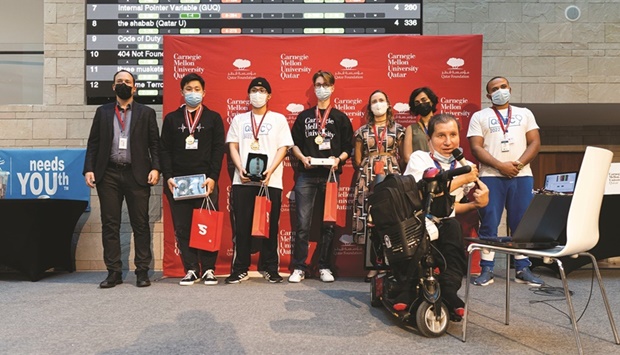Teams from Carnegie Mellon University in Qatar (CMU-Q) and Qatar University (QU) took the top two spots at the 2022 Qatar Collegiate Programming Competition (QCPC). Both teams will advance to the regional competition in Egypt in December. The competition was hosted by CMU-Q, a Qatar Foundation partner university.
The students on the winning team—Thang Bui, Andrey Genze and Ulan Seitkaliyev—are studying computer science at CMU-Q. All three students placed in the top two of last year’s competition as well. The silver medallist team members were Ahmed Ashraf, Youssef Elshahawy, and Faisal Abughazaleh from QU. In his address at the closing ceremony, CMU-Q dean Michael Trick said: “Programming competitions are about building a community around creative problem solving. The more opportunities that young programmers in Qatar have to come together and solve problems, the more the computing ecosystem in Qatar will thrive.”
The competition was organised by CMU-Q’s Giselle Reis, associate area head and associate teaching professor of computer science, and Eduardo Feo Flushing, visiting assistant teaching professor of computer science. Reis noted how much the teams improved since last year’s competition. “We could see how the teams were more confident, and it was a much more competitive environment this year.” At CMU-Q, Reis and Feo Flushing hold several practice sessions each year for students to hone their competitive programming skills.
The event was organised in collaboration with Qatar Computing Research Institute and the Hamad Bin Jassim Center for K-12 Computer Science Education. Two representatives from the Africa and Arab Collegiate Programming Championship attended to oversee the competition: Mohamed Mahmoud Abdelwahab is the ACPC scientific committee head and Marie Belle Alhabr is an ACPC event coordinator. The event was sponsored by Nestle, Rimads and Snoonu.
The International Collegiate Programming Competition is the oldest and most prestigious of its kind, with national competitions held each year worldwide. Winners at the national level advance to regional competitions, and ultimately the ICPC World Finals. For this competition, students tackled a set of 13 programming problems over five hours.
The students on the winning team—Thang Bui, Andrey Genze and Ulan Seitkaliyev—are studying computer science at CMU-Q. All three students placed in the top two of last year’s competition as well. The silver medallist team members were Ahmed Ashraf, Youssef Elshahawy, and Faisal Abughazaleh from QU. In his address at the closing ceremony, CMU-Q dean Michael Trick said: “Programming competitions are about building a community around creative problem solving. The more opportunities that young programmers in Qatar have to come together and solve problems, the more the computing ecosystem in Qatar will thrive.”
The competition was organised by CMU-Q’s Giselle Reis, associate area head and associate teaching professor of computer science, and Eduardo Feo Flushing, visiting assistant teaching professor of computer science. Reis noted how much the teams improved since last year’s competition. “We could see how the teams were more confident, and it was a much more competitive environment this year.” At CMU-Q, Reis and Feo Flushing hold several practice sessions each year for students to hone their competitive programming skills.
The event was organised in collaboration with Qatar Computing Research Institute and the Hamad Bin Jassim Center for K-12 Computer Science Education. Two representatives from the Africa and Arab Collegiate Programming Championship attended to oversee the competition: Mohamed Mahmoud Abdelwahab is the ACPC scientific committee head and Marie Belle Alhabr is an ACPC event coordinator. The event was sponsored by Nestle, Rimads and Snoonu.
The International Collegiate Programming Competition is the oldest and most prestigious of its kind, with national competitions held each year worldwide. Winners at the national level advance to regional competitions, and ultimately the ICPC World Finals. For this competition, students tackled a set of 13 programming problems over five hours.

